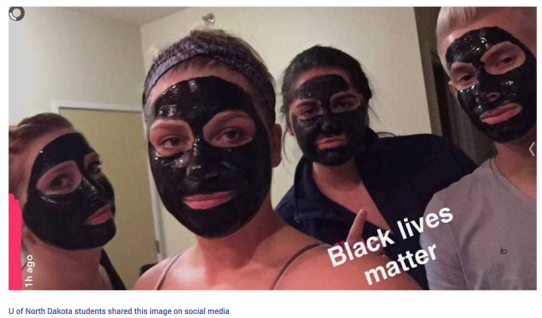When you're not sure how to enter the conversation (or if you should even be a part of it)...SPOILER ALERT: YOU SHOULD
In the aftermath of a series of jarring events--the deaths of Terrence Crutcher and Keith Lamont Scott, violence, protests--throughout the last few weeks, I know that so many people are hurting; are tired, angry, heartbroken. I know that others don't understand (and don't care to know) what's going on and that is an entirely different challenge. And still others who want to think, and talk, and listen in unfamiliar ways and have no idea where to begin.In an effort to contribute to this movement, to stand alongside--with, not behind or in front of--my brothers and sisters fighting to be seen fully and not read as stereotypes, I've curated a list of texts for anyone, but particularly white folks, who might be struggling with how to think and talk about the events of the last few weeks (and/or years) and to encourage us to consider issues, events, arguments, from other perspectives. I've provided a link to each text-- articles, podcasts, interviews, blog posts--and included brief excerpts to highlight notably powerful points.Engaging in exercises that challenge what we know to be "normal" is not only important, it's crucial; it's what builds our capacities for empathy, love, well-being, and possibility. Additionally, in light of the overt xenophobia, sexism, racism, and classism that have been a part of this presidential race, and with the first presidential debate happening tonight, I hope these resources are timely and helpful.I will also note that this is by no means an exhaustive compilation of resources and if you have other texts to recommend, please let me know and I will add them to the list.
Resource List
Screen Shot 2016-09-26 at 10.37.17 AM.png
Interview with Claudia Rankine, ‘Blackness in the white imagination has nothing to do with black people’:
Q: What the book does most powerfully is to make it clear that racism is everyone’s problem.CR: Racism is complicated. White people feel personally responsible for racism when they should understand the problem as systemic. It is interfering as much with their lives as with the lives of people of colour. And racism can lodge in them. It isn’t them yet it can become them if they are not taking notice.
This list of recent racist incidents on college campuses is just one example to challenge anyone maintaining that we're living in a "post-racial" society. It's also important to note that displays of overt racism on college campuses are far from a new phenomenon, but, as Dr. Shaun Harper explains, social media is changing the ways in which students on campus are able to document, report on, and talk about these incidents. Subsequently, it's also fostering unprecedented visibility and awareness of such serious issues at a national (and international) level. Harper, quoted in InsideHigher Ed, states:
'The racial ugliness on campuses and on social media in recent weeks are not new,' [Harper] said. 'White students did not just suddenly start painting the N-word and other racial epithets on black peers’ residence hall doors and on ethnic cultural centers. This has been occurring for many, many years.'What's different, he said, is that students are using social media and other creative forms of protest to attract attention [and raise awareness].
Screen Shot 2016-09-26 at 9.02.26 AM.png
In his piece, The Real Reason White People Say "All Lives Matter", John Halstead writes:
Many of the people saying “All Lives Matter” also are fond of saying “Blue Lives Matter.” If you find that the statement “Black Lives Matter” bothers you, but not “Blue Lives Matter,” then the operative word is “Black”. That should tell us something. There’s something deeply discomfiting about the word “Black.” I think it’s because it reminds us of our whiteness and challenges our notion that race doesn’t matter.
It’s Time to Get Over Your White Feelings and Start Taking Action for Black Lives
Many of us don’t have a lot of firsthand experience with social-change movements. We’re pretty good at expressing ourselves on Facebook, but we don’t routinely walk around with our views written on a sign. When you couple that unfamiliarity with most white people’s discomfort with being in the minority in a crowd, even those of us who want to show up at a protest can be hesitant. But that discomfort is itself a pretty good case for showing up. It tells us that there’s work to be done, and we have an obligation to help do it. “White people ought to challenge themselves to engage in more spaces of risk and difference,” organizer Umi Selah told the Washington Post.
There can be powerful lessons in these relatively insignificant white feelings of unease. Some low-level alienation at a Black Lives Matter event is nothing compared to a lifetime of being relegated to outsider status by the systems that run this country. “Empathy isn’t just remembering to say that must be really hard — it’s figuring out how to bring difficulty into the light so it can be seen at all,” writes Leslie Jamison in her book The Empathy Exams. “Empathy isn’t just listening, it’s asking the questions whose answers need to be listened to. Empathy requires inquiry as much as imagination. Empathy requires knowing you know nothing.” Acknowledging our feelings in the service of moving beyond them can lead to not just greater empathy but more powerful action.
“One thing is for sure,” writes Meyerson, “it’s the responsibility of whites interested in ending racism to sacrifice their comfort, ask questions, and take cues and orders from black people without relying on us to show you and tell you how.” We white people need to actively work on rising to these responsibilities. And, in order to address a problem as widespread and entrenched as anti-black racism in America, first we’ve got to get past our own feelings.
What White Folks and Non-Black POC Need to Understand About Systemic Racism
History is replete with black community leaders, activists, and thinkers who have been killed because they dared to speak out against brutality and injustice—Martin Luther King, Malcolm X, and Medgar Evers are just a few among many others. Some of these leaders practiced nonviolence, but all of them put themselves in danger to fight against inequality. Thus, the myth that black people should remain passive in the face of police brutality for change to come about is false. This notion has been proven untrue for decades.
The Code Switch Podcast, Episode 1: Can We Talk About Whiteness?
The problem is, by shying away from talking about whiteness, we also fail to understand the profound ways that whiteness shapes our culture and politics. And right now, in a crazy election cycle when folks' feelings about their own white identities is a strong predictor of how they're likely to vote, that's especially dangerous.And that, y'all, is what we're taking up on our inaugural episode: how we talk (anddon't talk about whiteness), and why it's really important we figure out how.
screen-shot-2016-09-26-at-10-44-24-am
When Black Death Goes Viral, it Can Trigger PTSD-like Trauma
Escaping the imagery can be nearly impossible, especially as online users post commentary and news updates. For some, it can merely be a nuisance. But research suggests that for people of color, frequent exposure to the shootings of black people can have long-term mental health effects. According to Monnica Williams, clinical psychologist and director of the Center for Mental Health Disparities at the University of Louisville, graphic videos (which she calls vicarious trauma) combined with lived experiences of racism, can create severe psychological problems reminiscent of post-traumatic stress syndrome.“There’s a heightened sense of fear and anxiety when you feel like you can’t trust the people who’ve been put in charge to keep you safe. Instead, you see them killing people who look like you,” she says. “Combined with the everyday instances of racism, like microaggressions and discrimination, that contributes to a sense of alienation and isolation. It’s race-based trauma.”
9 Things White People Can Do to Fight Racism Now
3. Talk to Family & FriendsI am a firm believer that we cannot fix anything until we change hearts and minds. And we do that by challenging those closest to us. It means that as you sit at the dinner table, and someone spews hateful things, bigoted statements and is just being racist, you speak up against it. This is not the time for you to sit in awkward silence, because you doing that is you being complicit in it. You are saying that you not only tolerate it but you might approve.On Facebook, as those you love are being prejudiced jerks, you don’t just scroll past it, rolling your eyes. No, you say something and you challenge it. You tell them that what they’re saying is not okay. You call them out on their bullshit.
The Conversation, What is Casual Racism?
Subtle forms of racism often go unnoticed (except for the person feeling the impact of them) and therefore, unaddressed. This racism can include speech and behaviours that treat cultural differences – such as forms of dress, cultural practices, physical features or accents – as problematic, manifesting in disapproving glances, exclusionary body language, and marginalising people’s experiences as invalid.
New York Magazine, In Conversation with Ava DuVernay:
...You put the title “history” on it and it’s supposed to be cemented. I’ve wanted to get in and deconstruct that. It’s about peeling back the layer from the mythology, whether the mythology is about patriarchy or [white] supremacy, or whether it’s about the fantasyland that many want to believe was the civil-rights movement. The actual movement was fractured, tense, multitiered, messy. It wasn’t everyone in lockstep marching and singing “We Shall Overcome.” And what they accomplished is more extraordinary than if they’d all gotten along. It’s a homogenization of radical black-liberation theology when you just say, “Oh, you know, he had a dream!” That’s horrible. It’s a vanilla-ing.
I'll end with a quote that I posted on Facebook five years ago today--one that reminds me why I do this work; one that, I hope, encourages others to stay in the fight:
At the core of our work is the belief, despite the distressing signs around us, that the world is indeed changeable; that it can be transformed into a better, more just, more peaceful place; and that the kids who show up in our classrooms each day not only deserve such a world, but can be instrumental in helping to bring it about. Their voices are abiding reminders that there is something to hope for in spite of the hopelessness that seems to be closing in around us--something tangible, something real, something in the here and now - Greg Michie, Holler If You Hear Me




